Obituary: Cora Blyth de Portillo, linguist


Cora Blyth de Portillo came from a well-known family in Fife. She was brought up and educated there and left after meeting Luis Gabriel Portillo while reading modern languages at Oxford. After her marriage she combined married life, bringing up a family and working in academia.
Her family, the Blyths, were owners of a linen weaving business based at the Hawkleymuir factory in Kirkcaldy’s Gallatown, which had been established in the 1830s. They were major donors to various activities in Kirkcaldy but the principal beneficiary was the town’s museum and art gallery, which was built on land donated by John Nairn (the linoleum manufacturer) on the former site of Balsusney House.
Advertisement
Hide AdAdvertisement
Hide AdThe museum was opened in 1925 when Cora presented a bouquet of roses to Gertrude Wemyss Honeyman – the daughter of John Nairn. John Blyth was the first chairman of the trustees (and remained so until his death in 1962) and his daughter, Cora, was the mother of the former Tory politician Michael Portillo.
John Blyth built a substantial residence, Wilby House, on Loughborough Road and became an avid but discerning buyer of Scottish artists. In 1910 he purchased Away to the West by William McTaggart. He hung paintings anywhere and everywhere – in his office, at the factory and at home. Cora remembered her father often smuggling a new acquisition into the house and then hiding it in a wardrobe.
Kirkcaldy Museum & Art Gallery became a second home to the collection and many works were displayed there on loan. Gavin Grant of the Fife Cultural Trust told The Scotsman: “The Blyth Collection is the single reason that Kirkcaldy has one of the finest collections of Scottish Colourists in Scotland. The McTaggarts and Peploes are a magnificent addition to the gallery.”
Cora Waldegrave Blyth de Portillo was educated at St Leonard’s School for Girls in St Andrews and then read Spanish and French at St Hilda’s College, Oxford. She got a First and also met Luis Gabriel Portillo a Castilian aristocrat. He had sacrificed a professorship at Salamanca University so that he could fight for the Republican army in the Spanish civil war. After Franco’s victory it was impossible for him to stay in Spain and when the Second World War was declared de Portillo was a registered alien in the UK. These difficult circumstances did not stop Blyth proposing to him and they married in 1941.
The family were restricted in their travel but Cora worked in a sensitive department of the postal services as a censor. She also worked in the BBC Latin American service.
After the war the family moved to Stanmore, Middlesex where Michael and his brothers attended Harrow County School. Cora taught French and Spanish at evening classes and later worked full-time in secondary schools. The war years proved traumatic as her flat in West London was bombed while she was preparing for her final exams. “We felt that the Germans might arrive any day,” Cora recalled years later. “We lost all fear of the final exams because we might have no future.”
At home the family spoke mostly Spanish and ate Spanish food. Cora was a vivacious and ebullient lady who was seldom seen doing nothing. She became a formidable worker on behalf of the Labour Party – her sitting room was often the local party’s committee room and the house was a hive of political activity. In later years she supported the Liberal Democrats and also worked tirelessly for Amnesty International. But Cora never lost contact with her family in Fife and made annual journeys north to let her children spend time with their Scottish grandparents. Michael Portillo recalled in his Great British Railway Journeys on BBC television: “My journey over the Forth Railway Bridge takes me back to my grandparents’ house in Kirkcaldy. That was very exciting.”
Cora also remained in contact with the museum which includes a superb collection of paintings by William McTaggart and Samuel Peploe – many of which now hang in the Blyth Room.
Advertisement
Hide AdAdvertisement
Hide AdHer students recall Cora’s enthusiastic teaching and her feisty but attractive personality. Michel Portillo once commented: “I’m certainly 50 per cent my mother’s son and I certainly have a lot of her characteristics. I do have a lot of tenacity, endurance and grit.”
In 2003, Cora de Portillo unveiled a blue plaque at Westfield House in Oxfordshire commemorating the 30 Basque children who had been cared for there during the war. De Portillo had been one of those volunteers. Her husband died in 1993 and she is survived by their four sons.